The Ultimate Guide for Mums Seeking Employment
Summary
Great work, you’re ready to re-enter the workforce! Take a moment to celebrate this significant step forward, because taking the initiative to return to work as a mother is a commendable and bold choice!
Now that you’re set to pursue employment, how can you ensure success in this transition? This comprehensive guide will walk you through everything from crafting your resume to handling interviews, whether they’re phone, virtual, or in-person. Preparation is the key to showcasing your capabilities effectively. Here’s how to get started.
Jump to:
- Understanding the landscape
- Preparing your CV
- Highlighting your personal brand
- Questions to expect during your interview (and how to answer them)
- Questions to ask during your interview
- Interviewing post-maternity
- Discussing sensitive topics
- Nailing the interview follow-up
Understanding the Landscape
The workforce landscape has undergone significant transformations, with more organisations recognising the value of diversity and the unique perspectives that working mums bring to the table. From part-time roles and freelance gigs to telecommuting options and flexible scheduling, the opportunities are vast and varied.
That being said, we know that a loss of confidence accompanies every woman’s re-entry into the workforce after motherhood, and we’re here to support you every step of that journey.
Here’s our co-founder, Lydia Miller, talking about the loss of confidence that new mums face when returning to work:
Preparing your CV
Your CV should be clear, concise, and tailored to each job:
- Tailor your CV: Customise your CV for each job application by highlighting experiences and skills that match the job description closely.
- Highlight achievements: Focus on the outcomes and impacts of your roles. Use quantifiable results to demonstrate your effectiveness.
- Include diverse experiences: Don’t overlook any work, such as freelance or volunteer positions that have helped you maintain or develop skills relevant to the roles you are applying for.
Did you know that a Hybrid CV is twice as likely to get chosen by a hiring manager?
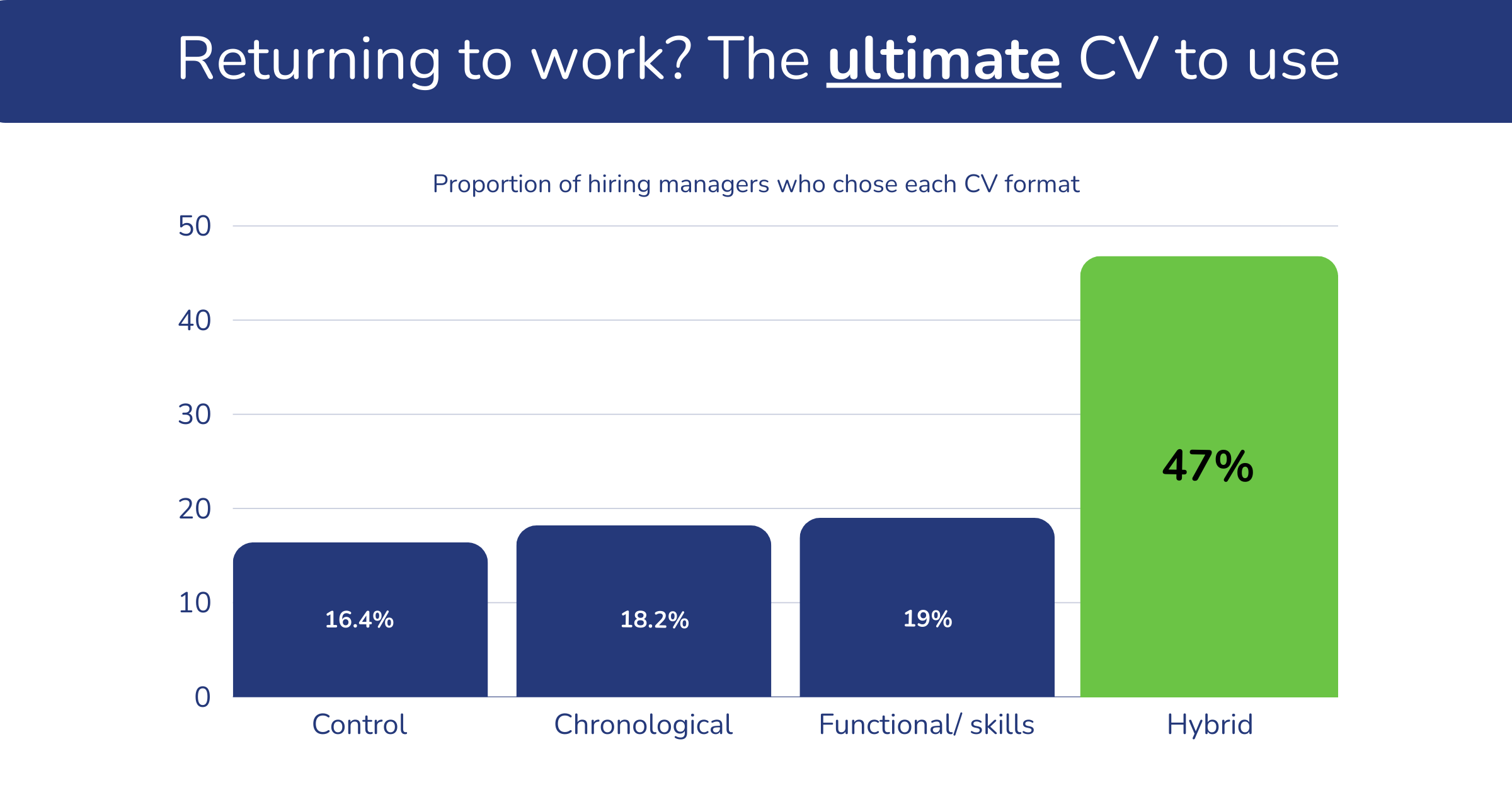
Here’s some top CV tips from the ivee team:
Highlighting your Personal Brand
Develop a personal brand that reflects your unique professional identity and distinguishes you from other candidates:
- Define your strengths: Identify what you excel at and how it adds value to a potential employer. These should align with the key competencies of the job you’re seeking.
- Communicate your values: Articulate how your personal values align with the company’s culture and mission.
- Professional online presence: Ensure that your LinkedIn profile and other professional social media accounts are up-to-date and reflect your personal brand accurately.
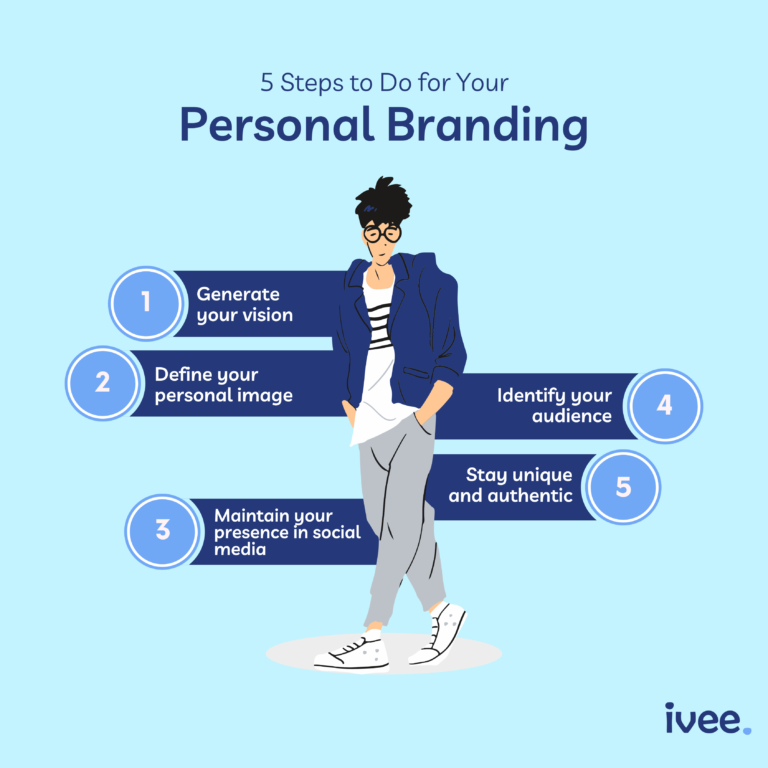
Questions to Expect During your Interview
As you prepare for interviews, anticipate questions that will explore your qualifications, work ethic, and cultural fit. Here’s how to craft compelling responses to some of the most frequently asked interview questions:
1. “Tell me about yourself.”
- Strategy: This open-ended question is often used to start interviews. It’s your chance to set the tone with a succinct, engaging narrative. Focus on your professional background, but make sure to weave in aspects that are specifically relevant to the job and company.
- Response Tips:
- Start with a brief overview of your educational background or early career, emphasizing experiences that relate to the position.
- Highlight your most recent professional experiences, focusing on roles and projects that align with the job you’re applying for.
- Conclude by connecting your background to why you are excited about this opportunity and how you can contribute to the company’s goals.
2. “What are your strengths?”
- Strategy: This question aims to assess how well your skills match the job requirements. Choose strengths that are most relevant to the position and substantiate them with concrete examples.
- Response Tips:
- Identify two or three core strengths that are directly applicable to the role. These might include technical skills, soft skills, or specific expertise.
- Provide specific examples from your previous work that demonstrate these strengths. For instance, if you identify “communication” as a strength, discuss a time when effective communication helped you resolve a conflict or lead a project successfully.
- Relate your strengths back to the potential contributions you can make to the prospective employer.
3. “Describe a challenge you faced and how you addressed it.”
- Strategy: Interviewers use this question to gauge your problem-solving skills, resilience, and ability to navigate difficulties. Choose a challenge that led to a positive outcome and highlights your professional growth.
- Response Tips:
- Select a significant challenge that required you to think critically and act decisively.
- Explain the situation briefly and focus more on your actions. Outline the steps you took to address the challenge, emphasizing your strategic thinking.
- Highlight the results of your efforts. It’s effective to quantify the outcome (e.g., improved efficiency by 20%, increased sales by 15%) as it concretely demonstrates the impact of your actions.
- Reflect on what you learned from the experience and, if applicable, how it prepared you for similar challenges in the future.
General Tips for Answering Interview Questions:
- Practice the STAR method (Situation, Task, Action, Result): This technique helps you structure your answers clearly and effectively, ensuring you highlight relevant details and outcomes.
- Be concise and focused: While it’s important to provide enough detail, avoid meandering or getting off-topic. Keep your answers direct and to the point.
- Tailor your responses: Always consider the company and the specific role when crafting your answers. Customize your responses to reflect the company’s values, culture, and the specific skills the job requires.
Questions to Ask During your Interview
Asking well-thought-out questions during your interview not only shows your enthusiasm and commitment to the role and the organization but also gives you crucial information on whether the opportunity aligns with your professional goals and personal values. Tailoring your questions to the specific role and the company’s unique characteristics can significantly enhance the quality of your interaction with the interviewer. Here are some targeted questions to consider:
1. “What are the key challenges facing this role in the first six months?”
- Why to ask: This question helps you understand immediate priorities and the specific challenges you might face if hired. It also signals your forward-thinking approach and readiness to hit the ground running.
- Tailoring to the role: If the role involves managing projects, you might ask, “Can you describe some of the projects that I would be taking on in the first six months, and what challenges might accompany these?”
2. “How does the company support ongoing professional development?”
- Why to ask: This question indicates your interest in growth and development, key factors for long-term career success. It also gives insight into how the company invests in its employees.
- Tailoring to the role: If you are applying for a technical position, you might specify, “What opportunities are there for technical training or certifications in this position?”
3. “Can you describe the company’s approach to work-life balance?”
- Why to ask: Understanding the company’s culture regarding work-life balance is crucial, especially if you are looking to manage professional and personal commitments effectively.
- Tailoring to the role: If the role involves irregular hours or overtime, you might ask, “Given the demanding nature of this role, how does the company support employees in maintaining a healthy work-life balance?”
4. “What are the performance expectations for this role, and how are they measured?”
- Why to ask: This question helps you understand what success looks like in the position and how your performance will be evaluated.
- Tailoring to the role: If the position is sales-related, you could ask, “What are the key performance indicators for success in this sales role, and over what time frame are these typically assessed?”
Additional Questions to Consider:
- Team Dynamics: “Can you tell me about the team I will be working with?”
- Company Vision: “Where do you see the company in the next five years, and how does this department contribute to achieving that vision?”
- Recent Changes: “Has the company made any significant changes, such as new products or markets, in the last year?”
- Next Steps: “What are the next steps in the interview process?”
By tailoring your questions to the role and showing a keen interest in the company’s operations and culture, you signal not only your preparedness but also your potential to be a proactive and engaged member of their team. This approach helps you leave a memorable impression and better assess if the role aligns with your career and personal goals.
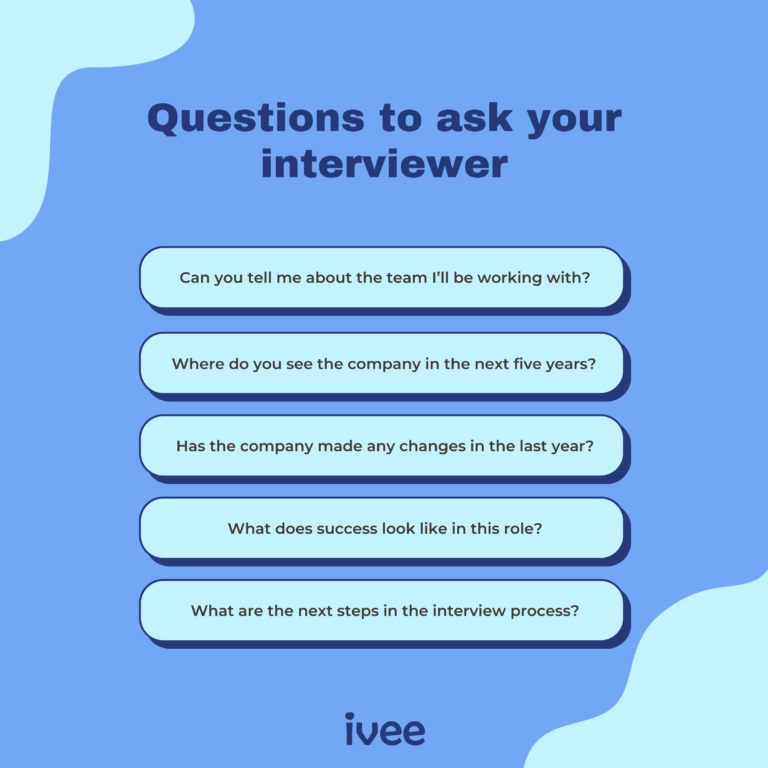
Interviewing Post-Maternity
Effectively communicate the positive aspects of your time away from the workforce:
- Emphasise skills: Discuss any skills you’ve maintained or developed during maternity leave, such as strategic planning, leadership, or digital literacy through online courses.
- Be transparent and positive: Explain how maternity leave has provided you with renewed motivation and a clearer career focus, making you eager and ready to return to work.
Discussing Sensitive Topics
Navigating sensitive topics like resume gaps and the need for workplace flexibility can be challenging during interviews. However, handling these conversations with confidence and strategic insight can turn potential weaknesses into demonstrations of your strength and suitability for the role. Here’s how to approach these discussions:
1. Addressing Gaps in Your CV
- Be straightforward and positive: Begin by acknowledging the gap directly. Explain the reason without apology—whether it was due to maternity leave, personal development, or another valid reason. Emphasise any constructive activities you engaged in during the period, such as volunteering, freelancing, courses, or certifications.
- Highlight developed skills: Discuss skills and experiences gained during your break that are applicable to the job. For example, managing a project voluntarily can showcase leadership, planning, and execution skills.
- Link the gap to personal growth: Explain how the time away has given you fresh perspectives or enhanced soft skills like time management, resilience, or problem-solving, which are valuable in any role.
- Actionable Tip: Prepare a concise, positive statement about your career gap to use in interviews, ensuring it reflects growth and readiness to return to work.
2. Negotiating Flexibility
- Express the need clearly: Start the conversation about flexibility by clearly defining what you need—whether it’s remote work options, flexible hours, or a four-day workweek. Be specific about your requirements but open to solutions.
- Demonstrate value: Connect your flexibility needs to your productivity and effectiveness. For example, if you’re more productive during certain hours or in a less traditional work setting, share this with your potential employer. Provide examples from past experiences where you successfully managed your responsibilities in a flexible arrangement.
- Mutual benefits: Emphasise how flexible arrangements can benefit both you and the company, such as greater productivity, higher job satisfaction, and retention. Be prepared to discuss how you will manage communication and deliverables within flexible hours.
- Actionable Tip: Research the company’s culture and policies on flexibility beforehand through their website, social media, or reviews on platforms like Glassdoor. This will help you tailor your request to what’s already feasible within the company and frame your conversation accordingly.
3. Preparing for the Discussion
- Practice your responses: Before the interview, practice how you’ll discuss these topics by role-playing with a friend or mentor. This preparation will help you approach the real conversation with more confidence and poise.
- Provide reassurance: Always conclude your explanation by reassuring the interviewer of your commitment and ability to meet the job requirements, despite any gaps or need for flexibility.
- Follow up with questions: After addressing these sensitive topics, ask the interviewer how the company has accommodated similar situations in the past. This not only shows your interest in joining a supportive workplace but also helps you gauge their openness to flexibility.
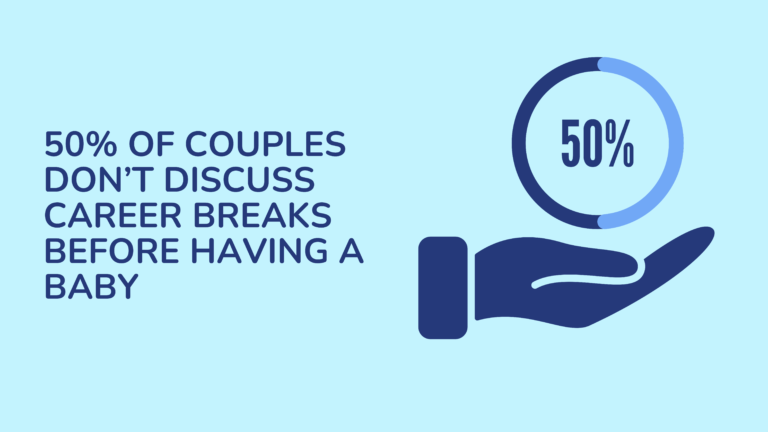
Nailing the Interview Follow-up
Leave a lasting impression with a strategic follow-up:
- Send a thank you email: Quickly follow up with a personalised thank you note to each interviewer, reiterating your interest in the role and reflecting briefly on how the interview reinforced your enthusiasm.
- Reiterate your fit and interest: Recap how your skills and experiences make you an ideal fit for the role, possibly adding new insights that emerged during the interview.
- Keep it professional: Even if you opt for a creative follow-up, such as a thank you video, maintain a professional tone throughout.
Conclusion
The journey to find the perfect job as a mum might be fraught with challenges, but it’s far from impossible. By focusing on industries and roles that value flexibility and work-life balance, you can forge a career path that doesn’t compromise your role as a mother. Remember, the key to success lies in clear communication, self-confidence, and the relentless pursuit of opportunities that align with your life’s priorities.
For more resources and opportunities tailored to mums looking for flexible job options, visit ivee.jobs. Dive into a platform designed with your unique needs in mind, and take the next step in your career journey with confidence.
